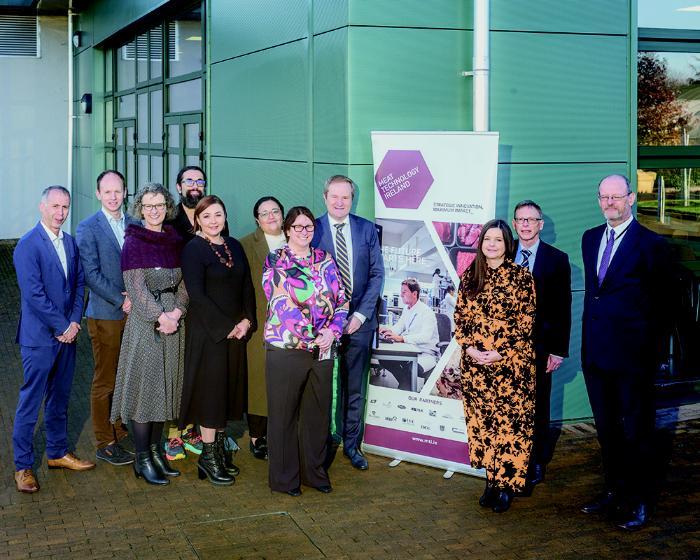18 November 2024
A collaborative approach
Collaboration across the meat processing industries ensures that Ireland maintains a competitive edge in a fast-paced, high-value global market. Words by: Dale Crammond, Director of Meat Industry Ireland.

Representatives from MII and MTI at the annual MTI conference. Photo credit: John Ohle
The establishment of Meat Technology Ireland (MTI) in 2016 was of critical importance to the meat industry, being the first industry-led innovation programme on the island where the needs of the industry are embedded in the specific objectives of the initiative.
Processors from Meat Industry Ireland (MII – the Ibec sector association which represents the primary beef, pork and lamb processing facilities) have been actively and enthusiastically engaged since the outset, working closely with Enterprise Ireland, Teagasc and the wider research community to deliver tangible benefits for the industry. This interaction has led to agreement on an exciting list of relevant projects that match the opportunities available in the marketplace.
The result of this collaboration is a centre with excellent potential to address some of our challenges, capitalise on opportunities and ultimately deliver growth for the beef and sheepmeat sectors. Now in its second phase of research, we have already seen the benefits, such as: genetic improvements, which have developed improved quality and consistency of raw material supply, and delivered a suite of health and nutrition characteristics of meat; packaging to increase shelf life; improved meat-eating quality; and a visionary approach, looking to the factory of the future. Technology developments and innovation are critical across all industries and the meat industry is no different.
The beef and sheepmeat sectors make an enormous contribution to rural Ireland, supporting 100,000 farm families. The sector supports 25,000 jobs in processing with large multiplier effects, providing prosperity to rural economies across the country. The meat sector has grown into a modern, efficient, outward-looking and forward-looking range of businesses, recognised internationally for the quality of its products. Its success is even more noteworthy given its dependence on exports into markets that are demanding and challenging, in which they face stiff competition from other large suppliers, with significant economies of scale. The sector had a phenomenal performance in 2023, with beef and sheepmeat exports valued at €2.7bn and €440m, respectively.
As a processing industry, we must never forget what we do, and that is working with our farmer suppliers to produce high-quality, nutrient-dense products for the global consumer. In a world where sustainability tends to dominate the narrative, food security cannot be forgotten.
Collaboration is key and MTI is a great example of what can be achieved when people work together. I want to recognise and acknowledge the close co-operation with Teagasc as host institute of MTI, and indeed the other participating research organisations. The outputs of MTI continue to be an important enabler for further developing Irish beef and sheepmeat exports, meeting marketplace requirements and growing value. Our reputation for product quality and safety are well renowned all over the world, and MTI will continue to provide new opportunities into new markets. I know this is another key pillar within MTI’s work programme, and I wish the MTI team and the wider research base continued success.
